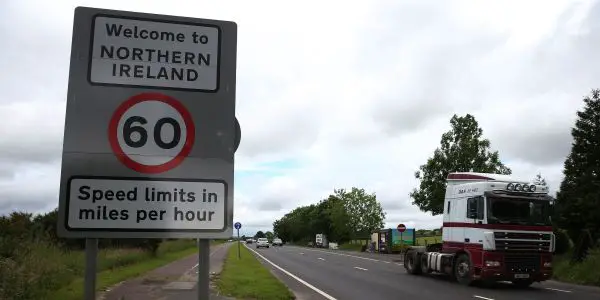People living along Ireland’s border are gripped by trepidation and fear in the countdown to the referendum, business chiefs have said.
The 310-mile frontier that separates Northern Ireland and the Republic of Ireland is the only land border between the UK and the rest of the EU.
Although heavily militarised with checkpoints and road closures during the Troubles, the peace process has opened up a seamless crossing between both jurisdictions.
Hundreds of thousands pass over the border every day on their way to work, for shopping or on day trips.
The Remain camp in the in/out referendum, including chancellor George Osborne, have warned a hardening of border controls would be inevitable in the event of the UK voting to leave the EU.
But those backing a Leave – including Northern Ireland Secretary Theresa Villiers – claim there would be no need for a return to checkpoints.
Sinead McLaughlin, chief executive of the Londonderry Chamber of Commerce, which represents traders in the UK’s most westerly city, says everyday life could be plunged into disarray with the outcome of Thursday’s vote.
“We are the largest city on the periphery of the UK, in three directions in this city we have an EU border, so we are watching with interest, trepidation and fear this referendum,” she said.
Nestled against Co Donegal in the Republic, Derry is a de facto cross-border capital for much of three counties in the north-west of Ireland.
“The impact of a Brexit will have a devastating economic impact on this region, which is already experiencing stark indices in relation to economic development and well-being,” said Ms McLaughlin, who is campaigning for a Remain vote.
“We are a frontier city, and our prospects depend on that union between the regions working effectively together.
“Instead of any barriers we need closer alliances with our neighbours.”
Businesses are “extremely frightened” at the prospect of new obstacles to trade and free movement being put in force while foreign investors – much needed in the historically economically deprived region – are also spooked.
“No one has been able to tell us what will happen after June 23 if the UK votes to leave,” said Ms McLaughlin.
“That has real negative impact, particularly with foreign investors.”
But Robert Moore, whose beef and tillage farm just outside the city is a stone’s throw from the border with Co Donegal, said there is a lot of scaremongering about the impact of a Brexit.
“I’m not overly concerned,” he said.
“My family have lived here for 200 years and since the border was created, so we have managed to cope with the border long before the Troubles.
“I remember as a child having to jump in and out of the car to get a card stamped when crossing.
“If that were to happen again it would be replaced by technology, cameras, etc. I think there is a lot of nonsense being talked about the border.”
Mr Moore describes himself as a reluctant member of the Leave camp.
“I just feel I’ve been pushed that way because of European policy,” he said.
“A lot in the Remain campaign are saying it depends upon reform within Europe, that we stay in and fight from within.
“The problem I see with that is that David Cameron has already negotiated his reforms.
“Britain has been the biggest thorn in the side of the EU for many years now. If we vote to stay in and then demand even more reform, they will tell Mr Cameron where to go.”
Mr Moore said people on both sides of the Irish border would not accept a hardening of frontier controls and believes “a deal will be done” between the British and Irish governments to ensure continued free movement.
However, Toni Forrester, chief executive of Letterkenny Chamber across the border in Co Donegal, is not convinced.
“Well, how will they control immigration which is the big thing that everyone is talking about?” she questioned.
“How will they control this land border we have with the UK? We believe there would have to be some type of control.”
Ms Forrester says traders in the Republic are frustrated that they have no vote in a decision that could have a major impact on their livelihoods.
